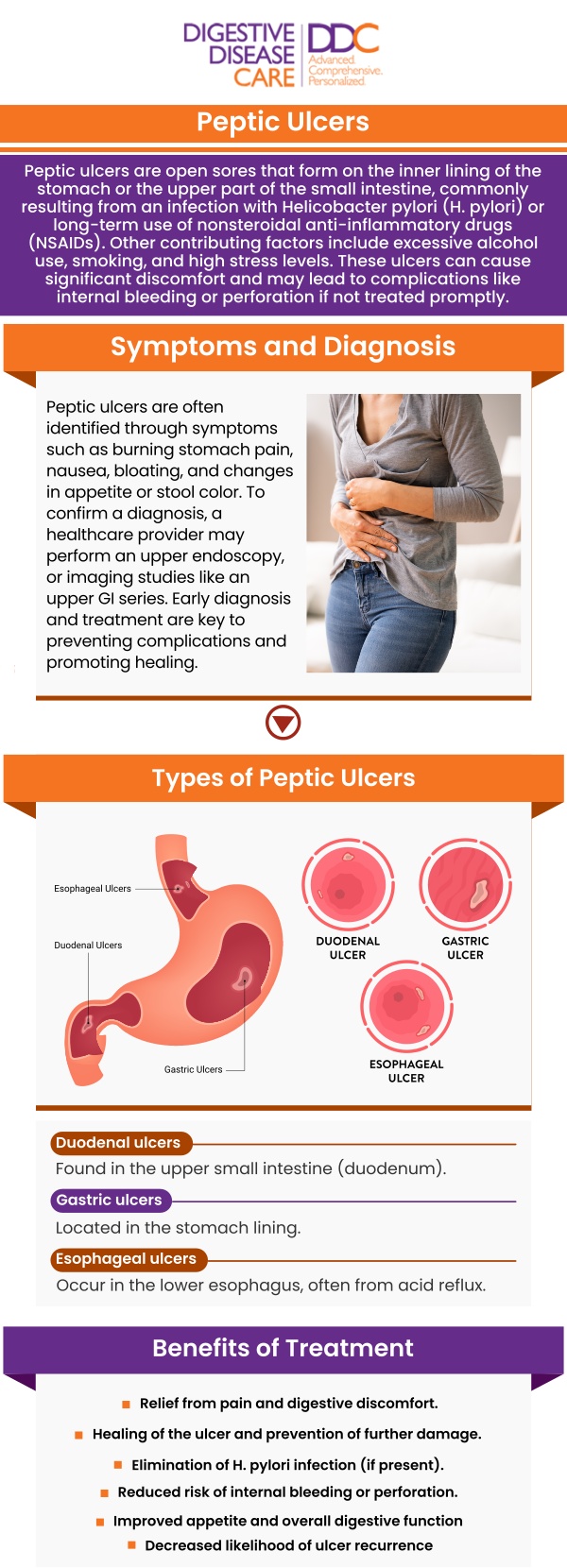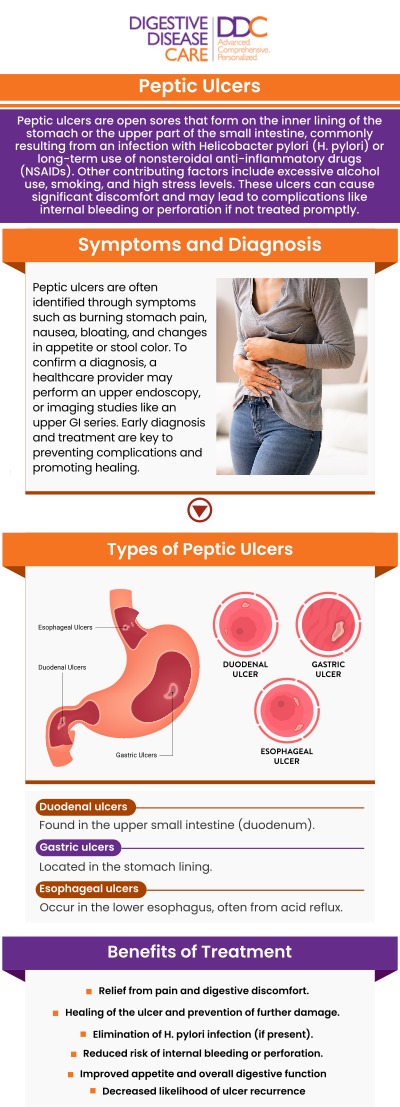Peptic Ulcerative Disease Treatment in Riverhead, NY
Peptic ulcerative disease refers to open sores that develop on the lining of the stomach, small intestine, or esophagus. It is commonly caused by an infection with Helicobacter pylori bacteria or the long-term use of nonsteroidal anti-inflammatory drugs (NSAIDs). Dr. Mejdi Ahmad, MD, and our board-certified team at Digestive Disease Care provide expert care to diagnose and treat this condition, helping manage symptoms and promote healing. For more information, contact us today or schedule an appointment online. We are conveniently located at 750 Old Country Rd, Riverhead, NY 11901.


Table of Contents:
What are the common symptoms of peptic ulcerative disease?
What causes peptic ulcerative disease?
How long does it take to heal a peptic ulcer?
When should I see a doctor for peptic ulcerative disease symptoms?
How Can Dr. Mejdi Ahmad, MD, and Our Team Effectively Treat Peptic Ulcerative Disease in New York?
Peptic ulcer disease (PUD) refers to open sores that develop on the inner lining of the stomach, small intestine, or esophagus. The condition is most commonly caused by an infection with Helicobacter pylori bacteria or the prolonged use of nonsteroidal anti-inflammatory drugs (NSAIDs). Symptoms of PUD can range from mild discomfort to severe pain, and may include:
• Abdominal Pain: The most common symptom, often described as a burning or gnawing pain in the stomach area. The pain is typically felt between the chest and belly button and can worsen when the stomach is empty or at night.
• Bloating: A sensation of fullness or bloating, especially after meals, is a common complaint in individuals with peptic ulcers.
• Heartburn and Indigestion: Many people with PUD experience frequent heartburn or indigestion, which can feel like a burning sensation in the chest or upper stomach.
• Nausea and Vomiting: Nausea, sometimes accompanied by vomiting, can occur, particularly if the ulcer has led to complications like gastric bleeding or obstruction.
• Loss of Appetite and Weight Loss: Pain or discomfort after eating may cause a reduced desire to eat, leading to unintended weight loss.
• Bleeding: In more severe cases, peptic ulcers may cause bleeding, which can lead to blood in the stool (dark, tarry stools) or vomiting blood, a serious complication requiring immediate medical attention.
If you experience these symptoms, it’s important to consult with our board-certified team of gastroenterologists at Digestive Disease Care for proper diagnosis and treatment to prevent complications and improve your digestive health.
Peptic ulcer disease (PUD) occurs when open sores or ulcers develop on the inner lining of the stomach, small intestine, or esophagus. Several factors contribute to the development of peptic ulcers, with the most common causes being Helicobacter pylori infection and the prolonged use of nonsteroidal anti-inflammatory drugs (NSAIDs).
• Helicobacter pylori Infection: The bacterium Helicobacter pylori (H. pylori) is the most common cause of peptic ulcers. This bacterium disrupts the protective mucus layer in the stomach, allowing stomach acids to damage the underlying tissue. H. pylori infection is widespread and often acquired in childhood but can remain dormant for years before causing symptoms.
• NSAIDs and Pain Relievers: Regular or prolonged use of NSAIDs can irritate the stomach lining and increase the risk of ulcers. NSAIDs inhibit the production of prostaglandins, which are chemicals that help protect the stomach lining from acid. Without these protective substances, the stomach becomes more vulnerable to acid-induced damage.
• Excessive Alcohol Consumption: Drinking excessive amounts of alcohol can irritate and erode the stomach lining, increasing the likelihood of ulcer formation.
• Smoking: Smoking increases stomach acid production and reduces the effectiveness of the stomach’s protective mechanisms, making smokers more susceptible to ulcers.
• Stress and Spicy Foods: While stress and spicy foods do not directly cause ulcers, they can aggravate existing ulcers or increase the discomfort associated with them.
Understanding the underlying causes of peptic ulcer disease is essential for effective treatment and prevention.
The healing time for a peptic ulcer can vary depending on the severity of the ulcer, its location, and the underlying cause. On average, it can take 2 to 8 weeks for a peptic ulcer to heal with proper treatment.
• H. pylori-Related Ulcers: If the ulcer is caused by an infection with Helicobacter pylori (H. pylori), treatment typically involves a combination of antibiotics and proton pump inhibitors (PPIs) to reduce stomach acid. With this regimen, the ulcer may begin to heal in 2 to 4 weeks, but it’s crucial to complete the full course of antibiotics to eliminate the bacteria completely and prevent recurrence.
• NSAID-Induced Ulcers: If the ulcer is caused by the use of nonsteroidal anti-inflammatory drugs (NSAIDs), healing can take 4 to 8 weeks. Stopping the use of NSAIDs, combined with acid-reducing medications, is essential for healing. In some cases, longer treatment may be necessary, especially if the ulcer is deep or has led to complications like bleeding.
• Lifestyle Factors: Avoiding irritants like alcohol, smoking, and spicy foods, and managing stress, can also help promote faster healing.
Our board-certified team of gastroenterologists at Digestive Disease Care can provide personalized treatment plans and monitor your progress to ensure proper healing of peptic ulcers.
It’s important to seek medical attention if you experience symptoms of peptic ulcer disease (PUD), especially if they are persistent, severe, or worsening. Our board-certified team of gastroenterologists at Digestive Disease Care recommends seeing a doctor if you experience:
• Persistent Abdominal Pain: If you have frequent or severe abdominal pain, especially if it feels like a burning or gnawing sensation that lasts for hours or occurs on an empty stomach.
• Blood in Stool or Vomit: Seeing blood in your stool (dark, tarry stools) or vomiting blood (which may appear as red or like coffee grounds) is a serious sign of bleeding from the ulcer and requires immediate medical attention.
• Nausea and Vomiting: If nausea is persistent or if vomiting becomes frequent, especially if you cannot keep food or fluids down, you should see a doctor.
• Unexplained Weight Loss: Significant, unexplained weight loss, along with symptoms like pain or discomfort after eating, could suggest a complication or an untreated ulcer.
• Severe Fatigue or Weakness: This may indicate a loss of blood from the ulcer, which can lead to anemia and needs immediate evaluation.
If you are experiencing any of these symptoms, consult with a gastroenterologist for an accurate diagnosis and timely treatment to prevent further complications.
• Personalized Care: Dr. Mejdi Ahmad, MD, and our board-certified team of gastroenterologists at Digestive Disease Care provide individualized care tailored to each patient’s unique needs and condition.
• Comprehensive Evaluation: Our team performs thorough evaluations, taking into account medical history, symptoms, and lifestyle factors to accurately diagnose the cause of peptic ulcer disease.
• Ongoing Monitoring: Regular follow-up appointments ensure that patients are effectively managing their condition, with adjustments to the care plan as needed to optimize health outcomes.
Comprehensive Approach: With Dr. Mejdi Ahmad, MD’s expertise and his team’s dedication, patients receive a holistic approach to managing peptic ulcer disease, focusing on both symptom relief and long-term digestive health.
Dr. Mejdi Ahmad, MD, and our team at Digestive Disease Care are dedicated to providing expert care for peptic ulcer disease. For more information, contact us today or schedule an appointment online. We are conveniently located at 750 Old Country Rd, Riverhead, NY 11901. We serve patients from Riverhead NY, Manorville NY, Westhampton NY, Calverton NY, Mattituck NY, and East Quogue NY.

Check Out Our 5 Star Reviews


Additional Services You May Like

Additional Services You May Like
- Abdominal Pain
- Acid Reflux
- Barretts Esophagus
- Bloating
- Capsule Endoscopy
- Celiac Disease
- Colon Cancer Screening
- Colonoscopy
- Constipation
- Crohns Disease
- Diarrhea
- Diverticulitis
- Esophageal PH Monitoring
- Fatty Liver
- Fibroscan
- Gallstones
- Gastroenterologist
- Gastric Chest Pain
- Gluten Intolerance
- Hemorrhoid
- Hemorrhoid Banding
- Hepatitis
- Irritable Bowel Syndrome
- Lactose Intolerance
- Pancreatitis
- Polyps
- Rectal Bleeding
- Stomach
- Ulcerative Colitis
- GI Urgent Care





